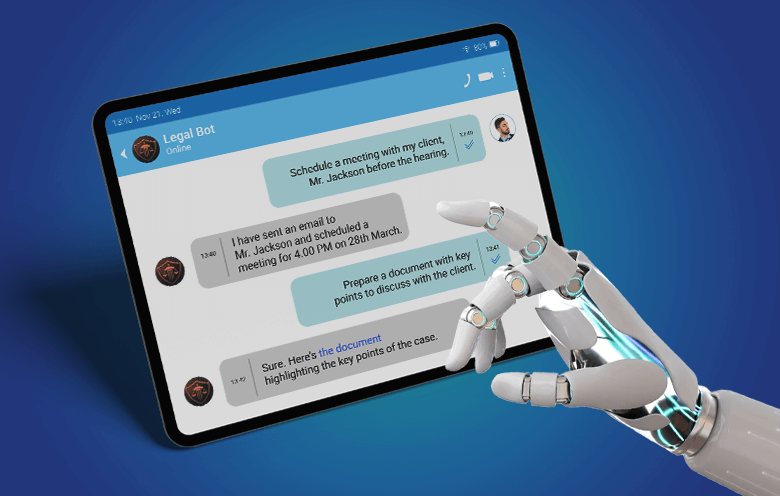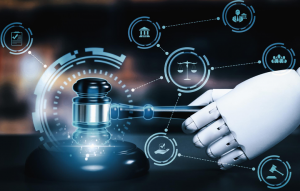The legal industry, steeped in tradition and meticulousness, finds itself at a crossroads. On one hand, the demand for legal services continues to rise, driven by an increasingly complex globalized world. On the other hand, law firms struggle to meet this demand while maintaining high-quality work and keeping costs competitive. This creates a significant challenge: ensuring access to justice for everyone while simultaneously ensuring the financial sustainability of legal practices.
More than 80% of respondents agree that generative AI will create “transformative efficiencies” within legal research and other routine tasks.
– A survey by PNR Newswire
Enter generative AI, a revolutionary technology with the potential to reshape the legal landscape. Generative AI, unlike traditional AI which analyzes existing data, can create entirely new documents and information. This groundbreaking capability presents a unique solution to the access-to-justice challenge. Let’s explore how.
Role of generative AI in law
Generative AI is no longer science fiction. Legal professionals are increasingly using it to automate repetitive tasks like contract review, due diligence, and legal research. This frees up valuable time for lawyers to focus on complex legal issues and client strategy. As more companies have started leveraging generative AI consulting services, we can expect it to play a more prominent role in legal writing, negotiation support, and even rudimentary legal reasoning.
Benefits of generative AI in law
- Boost efficiency: Automating repetitive tasks allows lawyers to work on higher-value activities, leading to increased productivity and faster turnaround times.
- Enhance accuracy: Generative AI can analyze vast amounts of legal data to identify potential risks and inconsistencies, leading to more accurate and watertight legal documents.
- Increase accessibility: By automating basic legal tasks, GenAI can make legal services more affordable and accessible to a broader range of individuals and businesses.
Suggested: Generative AI applications for the business world
Generative AI use cases for the legal industry
Legal writing and editing:
- Automated drafting: AI can generate first drafts of legal documents like wills, pleadings, and motions based on user input and pre-defined templates. This frees lawyers to focus on customizing and tailoring the document to the specific case.
- Enhanced legal briefs: Generative AI can analyze case law and precedents to create summaries with key arguments and supporting evidence, saving lawyers hours of research and writing.
- Intelligent editing and proofreading: AI can identify grammatical errors, inconsistencies in legal citations, and suggest improvements to clarity and conciseness in legal documents.
E-discovery and legal compliance:
- Automated document review: AI can quickly scan large volumes of electronic documents during discovery, identifying relevant keywords and highlighting potentially privileged information.
- Regulatory compliance analysis: Generative AI can analyze regulations and legal updates to identify potential compliance risks for companies, helping them stay ahead of evolving legal landscapes.
Client service and legal chatbots:
- AI-powered chatbots: Law firms can leverage chatbots powered by generative AI to answer routine client inquiries, schedule appointments, and provide basic legal information. This improves client service availability and reduces administrative burdens.
- Personalized legal document generation: AI can personalize legal documents for clients, such as non-disclosure agreements or standard terms of service, based on their specific needs and industry practices.
Streamline your legal workflow with autonomous AI agent
Legal analytics and prediction:
- Predictive legal outcomes: Generative AI can analyze vast datasets of past cases and legal decisions to identify patterns and predict the likelihood of success in specific legal matters. This empowers lawyers to develop more informed strategies for their clients.
- Contract risk assessment: AI can analyze contracts to identify potential risks and hidden clauses, helping businesses make informed decisions during negotiations.
Legal education and training:
- AI-powered case studies and simulations: Law schools and legal training programs can utilize generative AI to create interactive case studies and simulations, providing students with a realistic and personalized learning experience.
- Automated legal research assistants: Law students and junior lawyers can leverage gen AI assistants to conduct legal research more efficiently, by summarizing complex legal topics and identifying relevant case law.
Responsible integration of generative AI
Legal professionals can integrate generative AI responsibly by:
- Maintaining oversight: Lawyers should always review and approve all AI-generated documents before using them.
- Transparency with clients: Clients should be informed about the use of AI in their legal matters and understand its limitations.
- Focus on the human element: AI should be seen as a tool to enhance the lawyer’s expertise, not replace it.
Potential of generative AI in the legal field
The potential of generative AI in the legal field is immense. It has the power to:
- Democratize legal services: By automating basic tasks, AI can make legal services more affordable and accessible to everyone.
- Transform legal workflows: AI can streamline legal workflows, allowing lawyers to focus on complex strategic issues.
- Enhance legal accuracy: AI can analyze vast amounts of data to identify potential risks and inconsistencies, leading to more accurate legal services.
How Softweb Solutions can help with implementing generative AI
Softweb Solutions, with its expertise in generative AI and the legal industry, can be a valuable partner in your firm’s journey towards implementing this transformative technology. Here’s how we can assist you:
1. Strategic generative AI consulting and planning
- Identifying use cases
- Developing a roadmap
- Ethical considerations
2. Technology implementation and integration
- AI model selection and customization
- Data management and integration
- Workflow integration
3. Ongoing support and maintenance
- Model optimization and monitoring
- User training and adoption
- Security and compliance
Serve justice with GenAI
The future of legal services is undeniably intertwined with generative AI. While challenges remain, the potential for increased efficiency, accuracy, and accessibility is undeniable. By embracing this technology responsibly and with the guidance of a trusted partner like Softweb Solutions, legal professionals can usher in a new era of legal services with generative AI consulting.









